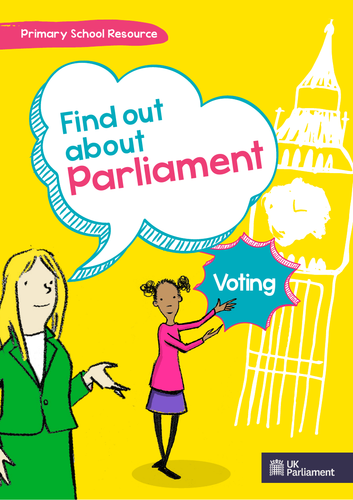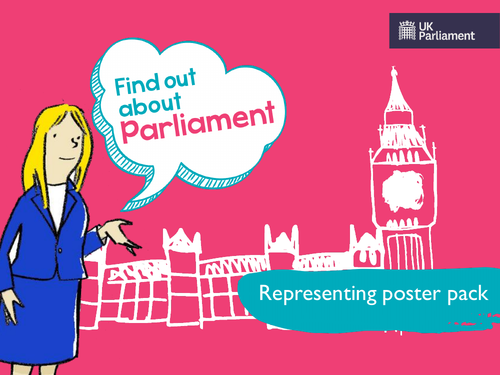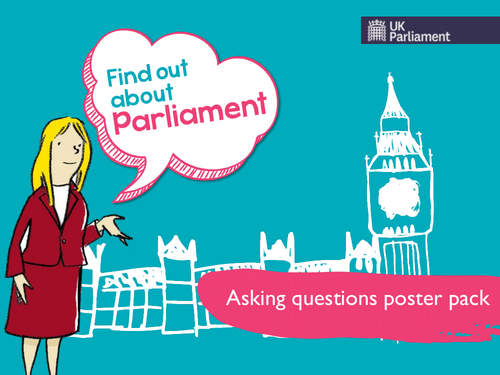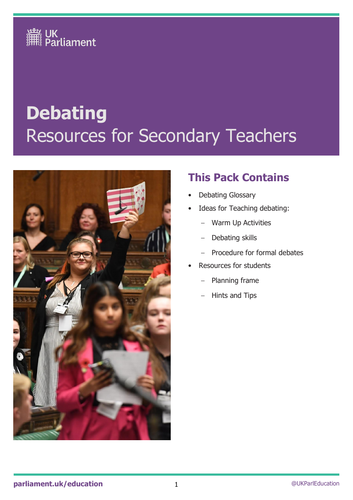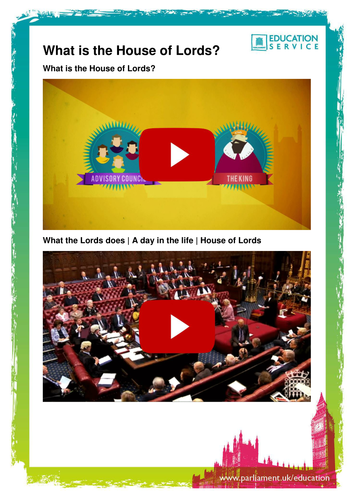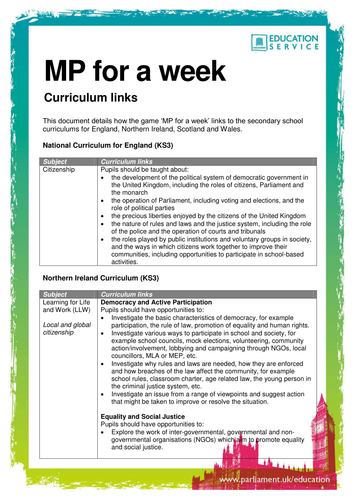22Uploads
237k+Views
127k+Downloads
Citizenship

Magna Carta for the 21st century, video
Encourage students to consider how Magna Carta still affects our rights and responsibilities today and which rights and freedoms they feel are important enough to be enshrined in their own ‘Magna Carta for the 21st century’.

Simon de Montfort, video
Simon de Montfort’s Parliament represented a crucial step on the path to parliamentary democracy. For the first time, it brought together representatives from different towns and cities – a principle which can be seen reflected in the make-up of the modern House of Commons.
Bring the story of Simon de Montfort and his 1265 Parliament to life with this video drama and explore the emergence of Parliament and local representation.
These resources are suitable for Citizenship lessons exploring the origins of local representation in Parliament, or History, specifically as part of the KS3 ‘Magna Carta and the Emergence of Parliament’ curriculum.
All images subject to copyright, click here for more information.

Votes for Women, video and resource pack
An audio drama following Suffragette Lady Constance Lytton as she protests for women’s right to vote, accompanied by plans to utilise this as part of a debate-based lesson or assembly.

Voting systems, resource pack
This resource contains a table summarising the key points of voting systems used within the UK and in Europe, as well as ideas about how to encourage students to analyse their purpose, benefits and limitations.

Inequality in the UK, presentation
This presentation compares campaigns against race inequality by 18th century abolitionist Olaudah Equiano and Doreen Lawrence, who sought justice for her murdered son Stephen in the 1990s.
Students will explore what lessons can be learned from Equiano and Lawrence as they consider their own campaigns for equality.
Time required: 40 minutes

Introduction to UK Parliament, video
This animation is an ideal starting point for introducing Parliament to pupils aged 7-11. It covers the structure of Parliament and our democracy, making laws, elections and voting and alternative ways of getting your voice heard.

How laws are made, video
Introduce your students to the legislative process with this two-minute overview of how bills become laws. Then follow up with lesson activities introducing the idea that a key function of Parliament is to make and amend law and details the various different stages a bill must pass through to become law.

General Elections Primary Assembly
Use this short presentation to learn about general elections with primary pupils.
Explore what happens before, during and after a general election using this short presentation, ideal to use as a class or in a school assembly.
Pupils will learn about:
What happens before a general election
What happens on the day of a general election
What happens afterwards

General Elections Secondary Assembly
Use this presentation to teach your secondary pupils about general elections.
Explore what happens before, during and after a general using this short presentation, ideal to use as a school or year assembly.
Students will learn about:
What happens before and after a general election
What happens on the day of a general election
How First Past the Post works

First Mass Petition, Votes for Women
Link to interactive resource: http://www.teach1866petition.com/
An online resource with supporting worksheets that brings the women’s suffrage campaign to life for students aged 11-16. The resource explores the 1866 petition which called for women’s right to vote and was signed by women across the United Kingdom.
Students follow the journey of the suffrage campaign through video, audio and quizzes, while source based activities help pupils develop source analysis skills. The supporting regional worksheets provide a local history focus for students to learn more about suffrage campaigning and key women in their area.
The resource is designed for students to use independently using a tablet or computer. It is split into distinct chapters so that students follow the story from start to finish. Prior to the lesson, teachers can download supporting worksheets which are designed to be completed separately once students have worked through the online resource.
Students will learn about:
The 1866 petition, how it started, how it was debated in Parliament and how it sparked a nationwide movement
What life was like in 1866 and the rights women had
The 1866 petition in more detail, testing out their source analysis skills and discovering how many people signed in their area

Voting Primary Resource
The ‘Find out about Parliament’ series, is an introduction to the work of Parliament through activities, stories and imagery, for pupils aged 5-8.
The resources have practical and accessible ideas to get pupils thinking about how they make decisions in a group. Younger pupils will enjoy listening to the stories which explore each theme in a familiar context, while the poster pack provides a stimulus to extend pupils’ understanding of each concept and how it relates to Parliament.

What does representing mean? Primary resource
The ‘Find out about Parliament’ series, is an introduction to the work of Parliament through activities, stories and imagery, for pupils aged 5-8.
The resources have practical and accessible ideas to get pupils thinking about what it means to represent other people. Younger pupils will enjoy listening to the stories which explore each theme in a familiar context, while the poster pack provides a stimulus to extend pupils’ understanding of each concept and how it relates to Parliament.
For the full range of UK Parliament Education Resources, visit: https://www.parliament.uk/education/

Asking Questions Primary Resource
The ‘Find out about Parliament’ series, is an introduction to the work of Parliament through activities, stories and imagery, for pupils aged 5-8.
The resources have practical ideas to get pupils thinking about why asking questions is important. Younger pupils will enjoy listening to the stories which explore each theme in a familiar context, while the poster pack provides a stimulus to extend pupils’ understanding of each concept and how it relates to Parliament.
Find our full range of UK Parliament Education resources here: https://www.parliament.uk/education/

Secondary Debating Resource
This pack includes teaching ideas and planning resources for students to help to prepare them to confidently debate.
Find our full selection of UK Parliament Resources at https://www.parliament.uk/education/

What is the House of Lords?
These resources answer the three following questions and are an ideal starting point for exploring the House of Lords with students:
- What is the House of Lords?
- How does the House of Lords work?
- Who is in the House of Lords?
Perfect for developing students’ knowledge further, and giving them a deeper understanding of what the House of Lords is, what people’s perceptions of the House of Lords are and how the House of Lords in influential in lawmaking.
Download the document for links to videos and supporting teacher packs.

What is the House of Commons?
Use this short animation to introduce your students to the House of Commons, or recap prior knowledge. It explores the history, role, work and membership of the Commons and how it holds the government to account.

MP For A Week
https://www.parliament.uk/education/teaching-resources-lesson-plans/mp-for-a-week-game/mp-for-a-week/
MP For A Week is a multi-level online game that aims to help students develop their political literacy. Students take on the political dilemmas faced by a backbench MP. Players can give speeches in debates, vote on laws, go to constituency events and take part in committee inquiries. Re-playable with three levels of curriculum-linked content, the game also features videos of real MPs giving game tips and explaining how Parliament works. Teachers can also access every game activity individually (currently over 150), a game guide and teachers’ notes.











